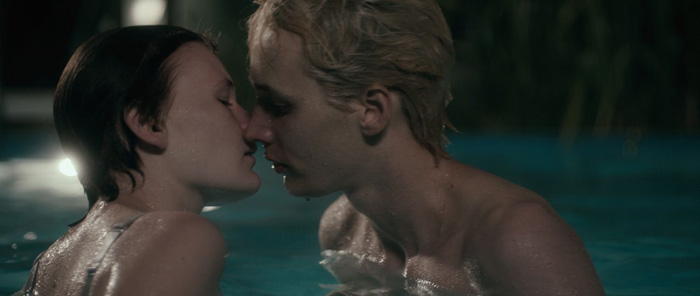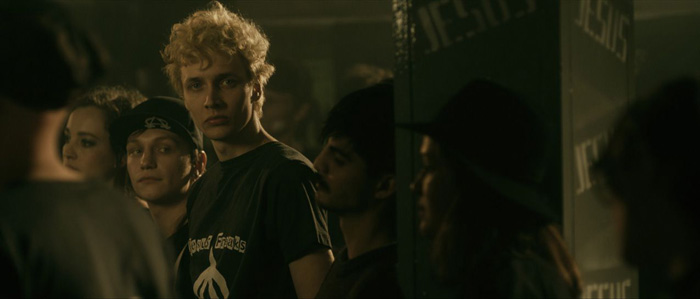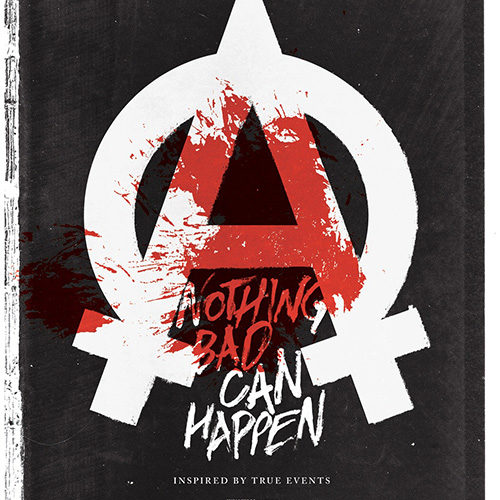I don’t believe it’s a coincidence that the words “Inspired by true events” only appear onscreen at the end of Nothing Bad Can Happen. The move might be specific to its American release since events as atrocious as those depicted are hardly the type to remain unknown in its home country of Germany before cameras rolled, but boy does reading it pack a punch here. Katrin Gebbe‘s debut is a tough pill to swallow on its own—a story so dedicated to its juxtaposition of depravity and the angelic young Jesus Freak doing all he can to stay true to his beliefs that you must think, “What kind of person would have such horrors bouncing around his/her head to write down?” And then you’re leveled by the notion all or most is true.

Told in three acts entitled Faith, Love, and Hope, the thought it would devolve into the nightmarish landscape of the soul it does shouldn’t cross your mind. How could it after being introduced to Tore (Julius Feldmeier) smiling ear-to-ear during his baptism as a follower of Jesus Christ? Dressed in a black tee with overturned crosses and following around a band of misfits embracing punk sensibilities and hardcore music screaming His name as the savior who died for their sins, you know a rough past has brought him to this point. Few who are Born Again are devoid of reason no matter how small, each looking for purpose in a world that’s otherwise left them unloved and alone. This is his rebirth, his cause above material gain. He’s to be Jesus’ newest bringer of miracles on Earth.
His faith is unyielding: brushing off epileptic seizures as the Holy Ghost and believing his prayer over a stranger’s (Sascha Alexander Gersak‘s Benno) stalled car brought it back to life. He follows his “sponsor” Eule (Daniel Michel) wherever he goes, playing missionary to the lost and compassionate to the dissenters. To Tore every new turn of events is a gift or test, a reward or trial to make him stronger. So when he watches a brother engage in premarital sex it’s merely a way to prove his morality through disappointed chastisement. And when he seizes in the middle of a crowded dance floor unfazed by his convulsions, the man he once helped who’s only present to see what the Jesus Freaks are really about becomes his protector. Benno reappears as a surrogate father, compensation for his unwavering fidelity.

It’s here that Gebbe constructs the perfect contrast of lifestyles as this new alliance foreshadows the evil to come. Even as Tore gleefully embraces his new adopted family, we sense things aren’t right. We glean early on that Benno isn’t the father of little Dennis (Til-Niklas Theinert) or teenaged Sanny (Swantje Kohlhof) and that his occupation may be less than legal. Their dynamic is strained at best, but all wear a smile while welcoming Tore in—Benno and the kids’ mother (Annika Kuhl‘s Astrid) acknowledging the opportunity to take advantage of the boy due to his trusting nature and desire for inclusion. Every step Tore takes forward therefore pushes him two steps back. Every chance to show Sanny and the others love inevitably breeding jealousy and rage from the formidable Benno until all façades are torn down.
The film begs us to believe; to have faith all will turn out right in the end. How else can we watch Tore’s magnanimous nature refuse to bend under the weight of indefensible abuse and not get sick to our stomachs? We yearn for the turn around—the vision of Jesus finally coming to him during an episode to say he no longer has to stay. Maybe a sign will even come to allow Tore the chance for retribution if not for self satisfaction and relief than at least to save Sanny from the fate she’s become too afraid to escape. This hope is literally the only thing that holds our attention besides the harrowing performances of victims and emptiness of predators. But we know in our hearts the chance of happily ever after is miniscule at best.

So we watch anyway, glued to the devolving nature of humanity as Benno’s malicious intent seeps into those around him for silent and boisterous complicity alike. Gersak’s a force to reckon with who’s possessed by so much confidence and hate he cannot fathom Tore would ever buck back. His reign of terror turns Astrid and a motley crew of friends into numb monsters too, each quick to feed off the thrill of inflicting pain if only because they’ve known the same suffering for too long themselves. Gebbe as a result creates a microcosm of humanity’s sinful nature and the ease at which it eats our souls. The setting’s tiny plot of garden land stands in for a world of atrocities as Tore serves as Jesus himself—love letting him willfully carry the agony away from Sanny and Dennis.
There’s a powerful message in turning the other cheek to separate good versus evil without doubt. Feldmeier carries the responsibility like a veteran of more credits than a short film and television episode to his name. We see the struggle in his eyes when Kohlhof’s Sanny throws herself his way as the only thanks she knows how to give for a kindness she’s never before received. He truly takes on everything following Jesus entails including living in his image to protect those he cares about. The abuse he suffers and goes back to take more of is unconscionable and yet he does so willingly to save those who cannot save themselves. It may seem counterintuitive, but at some point the horrors become so heinous that you almost have to believe in God for any of it to make sense.
Nothing Bad Can Happen hits limited release in LA on Friday, June 27th and NYC on Friday, July 3rd.

